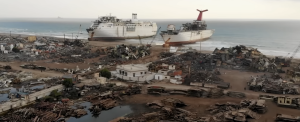Ship breaking and ship recycling is a billion-dollar industry that benefits economic giants in the Global North while leaving countries in the Global South, where environmental protections are weaker and labor laws are lax, to shoulder the environmental damage and human cost. Costs for workers include loss of health due to exposure to environmental toxins, injury and death.
Ship breaking is a forgotten issue, made palatable under the guise of “economic opportunity” for nations like Bangladesh, Pakistan, and India, whose steel industries rely heavily on recycled metal from abandoned ships. But these so-called “benefits” for developing countries ignore the brutal reality faced by the workers. Workers are paid meager wages for some of the most dangerous labor in the world. They dismantle massive ships with little protection, are exposed daily to toxins like asbestos and lead paint and face constant risk of injury or death from falling steel, fires or explosions. Their working and living conditions are often appalling.
Yes, environmental regulations such as the Basel Convention, the Hong Kong Convention, and the EU Ship Recycling Regulation (2013) exist. They are all designed to prevent wealthier countries from off-loading their ship waste in nations with weaker safeguards. Yet, Global North countries consistently find loopholes. The most notorious is the practice of “flags of convenience,” where ships are registered under foreign flags to sidestep accountability.
The ship breaking industry is capitalism at its most ruthless, those who risk the most in health and life earn the least, while companies in the host country and North grow richer off their backs. And so, the question arises: is this only about capitalism’s endless pursuit of profit, or is it also a reflection of the Global North’s underlying belief that the lives and labor of people in the Global South are worth less? That exploiting their labor is acceptable. Dismissing this exploitation by claiming that “at least it creates jobs” is one of the ugliest lies of capitalism. Jobs that strip people of dignity, health, and life itself are not opportunities. They are exploitation.
Watch this short Business Insider documentary on ship breaking in Gadani, Pakistan to see what this exploitation looks like up close: https://www.youtube.com/watch?v=hQVNtXIy3B4
